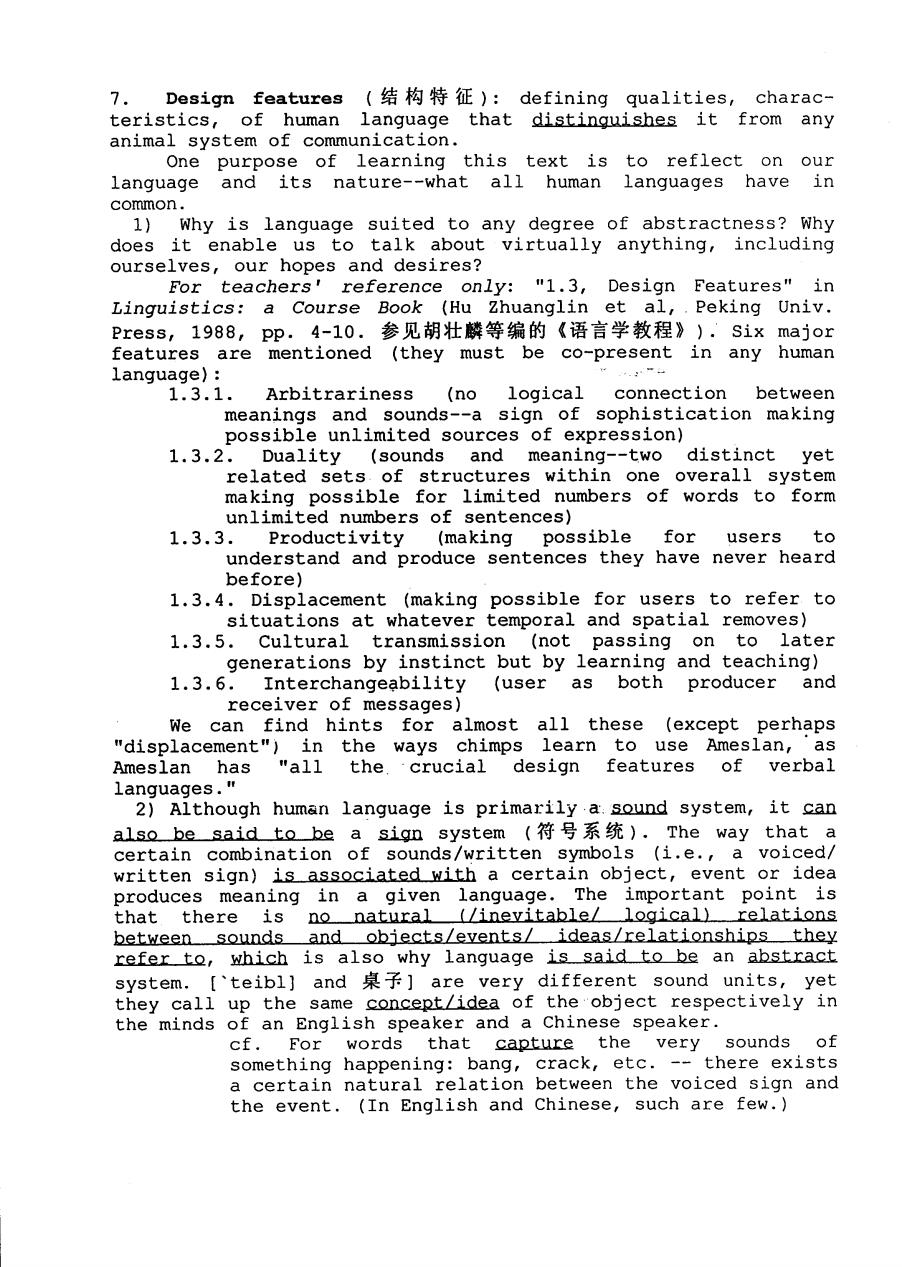
7.Design features(结构特征):defining qualities,charac- teristics,of human language that distinguishes it from any animal system of communication. One purpose of learning this text is to reflect on our language and its nature--what all human languages have in common. 1)Why is language suited to any degree of abstractness?Why does it enable us to talk about virtually anything,including ourselves,our hopes and desires? For teachers'reference only:"1.3,Design Features"in Linguistics:a Course Book (Hu Zhuanglin et al,.Peking Univ. Press.,1988,Pp.4-10.参见胡壮麟等编的《语言学教程》).'Six major features are mentioned (they must be co-present in any human language): 1.3.1.Arbitrariness (no logical connection between meanings and sounds--a sign of sophistication making possible unlimited sources of expression) 1.3.2.Duality (sounds and meaning--two distinct yet related sets.of structures within one overall system making possible for limited numbers of words to form unlimited numbers of sentences) 1.3.3.Productivity (making possible for users to understand and produce sentences they have never heard before) 1.3.4.Displacement (making possible for users to refer to situations at whatever temporal and spatial removes) 1.3.5.Cultural transmission (not passing on to later generations by instinct but by learning and teaching) 1.3.6.Interchangeability (user as both producer and receiver of messages) We can find hints for almost all these (except perhaps "displacement")in the ways chimps learn to use Ameslan,as Ameslan has "all the.crucial design features of verbal languages." 2)Although human language is primarily.a.sound system,it can also be said to be a sign system(符号系统).The way that a certain combination of sounds/written symbols (i.e.,a voiced/ written sign)is associated with a certain object,event or idea produces meaning in a given language.The important point is that there is no natural (/inevitablel logical)relations between sounds and objects/events/ideas/relationships they refer to,which is also why language is said to be an abstract system.['teibl]and]are very different sound units,yet they call up the same concept/idea of the object respectively in the minds of an English speaker and a Chinese speaker. cf.For words that capture the very sounds of something happening:bang,crack,etc.--there exists a certain natural relation between the voiced sign and the event.(In English and Chinese,such are few.)
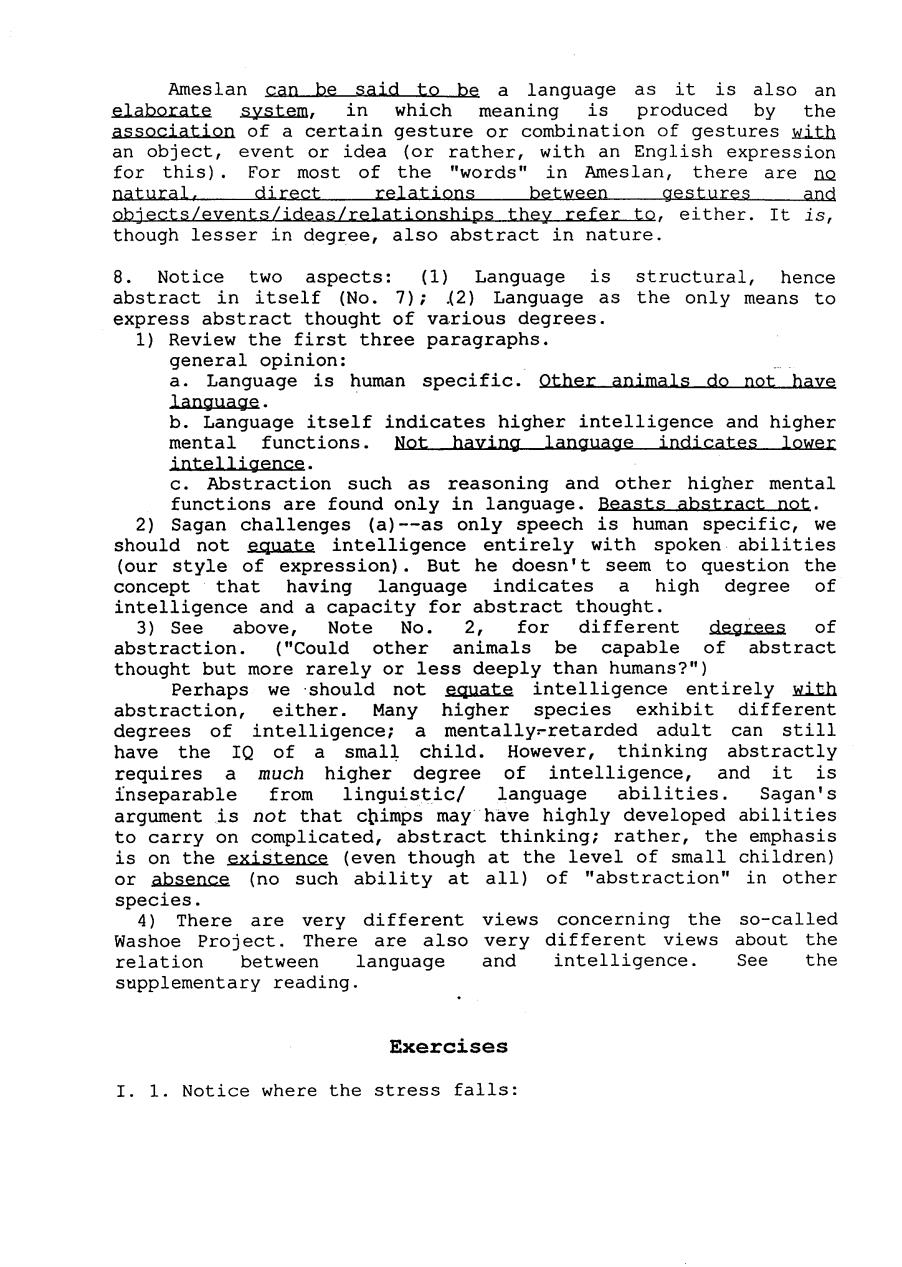
Ameslan can be said to be a language as it is also an elaborate system,in which meaning is produced by the association of a certain gesture or combination of gestures with an object,event or idea (or rather,with an English expression for this).For most of the "words"in Ameslan,there are no natural direct relations between gestures and objects/events/ideas/relationships they refer to,either.It is, though lesser in degree,also abstract in nature. 8.Notice two aspects:(1)Language is structural,hence abstract in itself (No.7);(2)Language as the only means to express abstract thought of various degrees. 1)Review the first three paragraphs. general opinion: a.Language is human specific.Other animals do not have language. b.Language itself indicates higher intelligence and higher mental functions.Not having language indicates lower intelligence. c.Abstraction such as reasoning and other higher mental functions are found only in language.Beasts abstract not. 2)Sagan challenges (a)--as only speech is human specific,we should not equate intelligence entirely with spoken.abilities (our style of expression).But he doesn't seem to question the concept that having language indicates a high degree of intelligence and a capacity for abstract thought. 3)See above,Note No.2,for different degrees of abstraction.("Could other animals be capable of abstract thought but more rarely or less deeply than humans?") Perhaps we should not equate intelligence entirely with abstraction,either.Many higher species exhibit different degrees of intelligence;a mentally-retarded adult can still have the IQ of a small child.However,thinking abstractly requires a much higher degree of intelligence,and it is inseparable from linguistic/language abilities.Sagan's argument is not that chimps may have highly developed abilities to carry on complicated,abstract thinking;rather,the emphasis is on the existence (even though at the level of small children) or absence (no such ability at all)of "abstraction"in other species. 4)There are very different views concerning the so-called Washoe Project.There are also very different views about the relation between language and intelligence. See the supplementary reading. Exercises I.1.Notice where the stress falls:
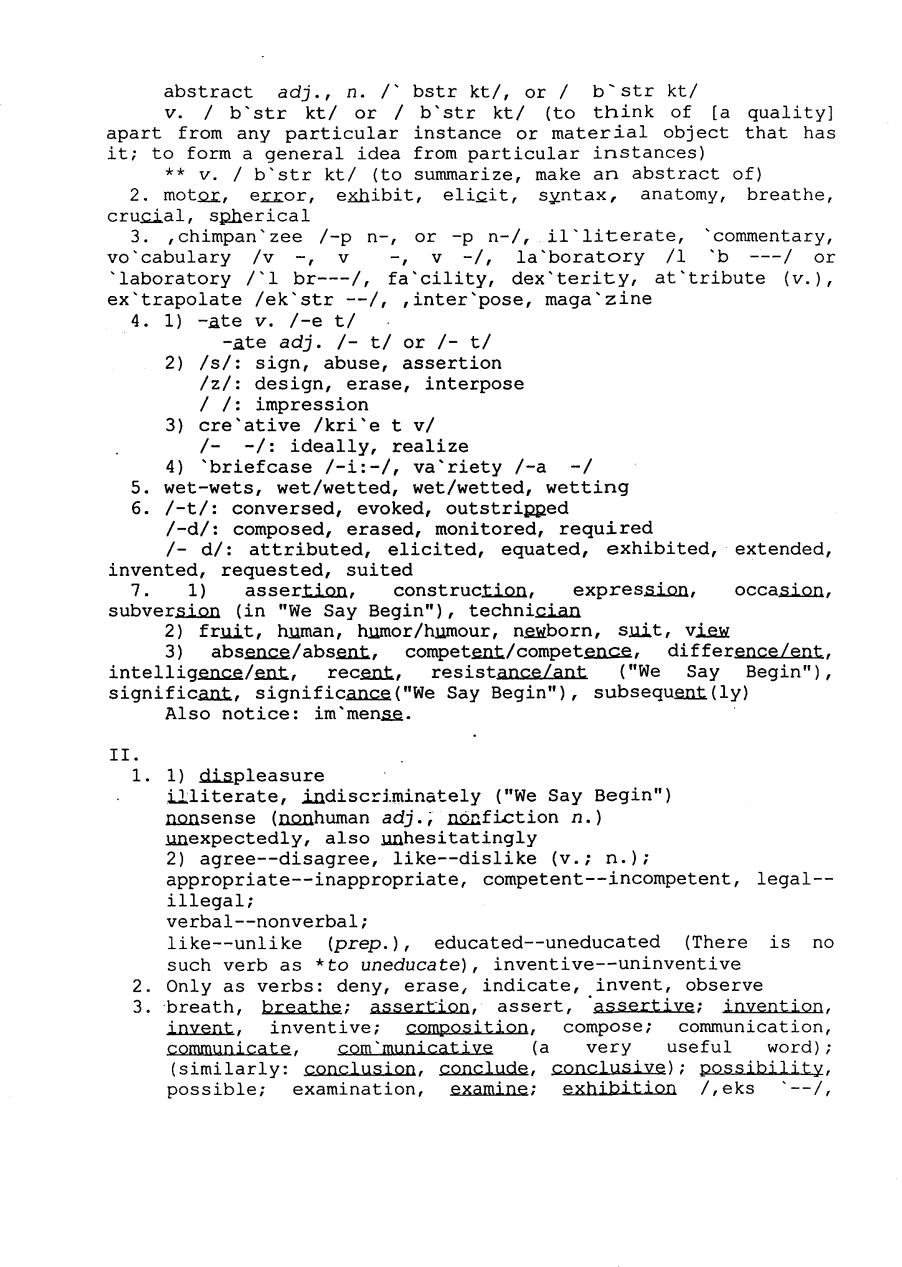
abstract adj.,n.bstr kt/,or b'str kt/ v.b'str kt/or b'str kt/(to think of [a quality] apart from any particular instance or material object that has it;to form a general idea from particular instances) *v.b'str kt/(to summarize,make an abstract of) 2.motor,error,exhibit,elicit,syntax,anatomy,breathe, crucial,spherical 3.,chimpan'zee /-p n-,or -p n-/,illiterate,commentary, vo'cabulary /v -v -,v-/,la'boratory /1 b---/or 'laboratory /1 br---/,fa'cility,dex'terity,at'tribute (v.) ex'trapolate /ek'str --/,inter'pose,maga'zine 4.1)-atev./-et/ -ate adj./t/or /-t/ 2)/s/:sign,abuse,assertion /z/:design,erase,interpose //impression 3)cre'ative /kri'e t v/ /--/ideally,realize 4)briefcase /-i:-/,va'riety /-a - 5.wet-wets,wet/wetted,wet/wetted,wetting 6./-t/:conversed,evoked,outstripped /-d/:composed,erased,monitored,required /-d/:attributed,elicited,equated,exhibited,extended, invented,requested,suited 7.1)assertion,construction,expression, occasion, subversion (in "We Say Begin"),technician 2)fruit,human,humor/humour,newborn,suit,view 3)absence/absent,competent/competence,difference/ent, intelligence/ent,recent,resistance/ant ("We Say Begin"), significant,significance("We Say Begin"),subsequent(ly) Also notice:im'mense. II. 1.1)displeasure illiterate,indiscriminately ("We Say Begin") nonsense (nonhuman adj.;nopfiction n.) unexpectedly,also unhesitatingly 2)agree--disagree,like--dislike (v.;n.); appropriate--inappropriate,competent--incompetent,legal-- illegal; verbal--nonverbal; like--unlike (prep.),educated--uneducated (There is no such verb as *to uneducate),inventive--uninventive 2.Only as verbs:deny,erase,indicate,invent,observe 3, breath,breathe;assertion,assert,assertive;invention, invent,inventive;composition,compose;communication, communicate,com'municative (a very useful word); (similarly:conclusion,conclude,conclusive);possibility, possible;examination, examine;exhibition /eks--/
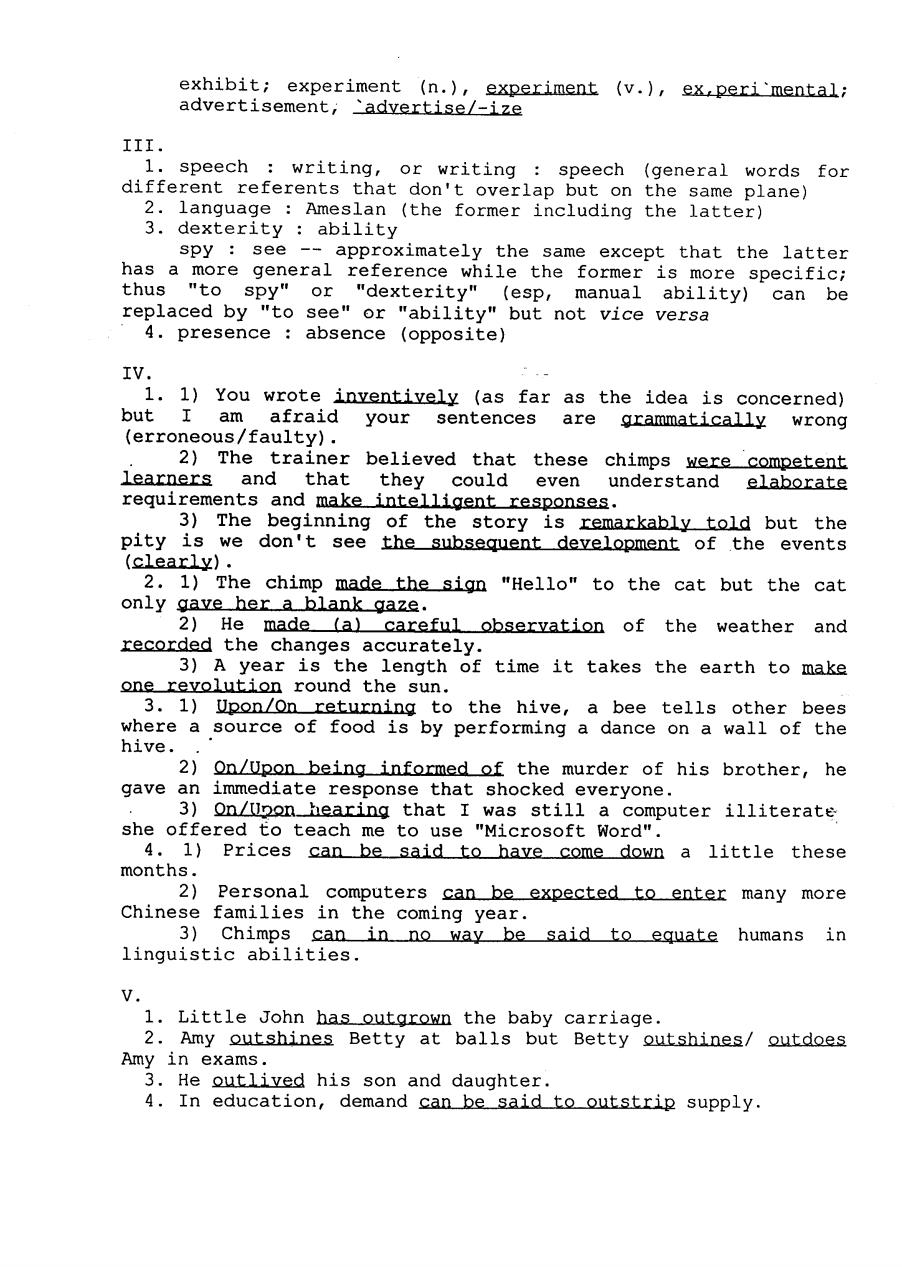
exhibit;experiment (n.),experiment (v.),ex,peri'mental; advertisement,advertise/-ize III. 1.speech writing,or writing speech (general words for different referents that don't overlap but on the same plane) 2.language Ameslan (the former including the latter) 3.dexterity ability spy see --approximately the same except that the latter has a more general reference while the former is more specific; thus "to spy"or "dexterity"(esp,manual ability)can be replaced by "to see"or "ability"but not vice versa 4.presence absence (opposite) IV. 1.1)You wrote inyentively (as far as the idea is concerned) but I am afraid your sentences are grammatically wrong (erroneous/faulty). 2)The trainer believed that these chimps were competent learners and that they could even understand elaborate requirements and make intelligent responses. 3)The beginning of the story is remarkably told but the pity is we don't see the subsequent development of the events (clearly). 2.1)The chimp made the sign "Hello"to the cat but the cat only gave her a blank gaze. 2)He made (a)careful obseryation of the weather and recorded the changes accurately. 3)A year is the length of time it takes the earth to make one revolution round the sun. 3.1)Upon/On returning to the hive,a bee tells other bees where a source of food is by performing a dance on a wall of the hive. 2)On/Upon being informed of the murder of his brother,he gave an immediate response that shocked everyone. 3)On/Upon_hearing that I was still a computer illiterate she offered to teach me to use "Microsoft Word". 4.1)Prices can be said to have come down a little these months. 2)Personal computers can be expected to enter many more Chinese families in the coming year. 3)Chimps can in no way be said to equate humans in linguistic abilities. V. 1.Little John has outgrown the baby carriage. 2.Amy outshines Betty at balls but Betty outshines/s outdoes Amy in exams. 3.He outlived his son and daughter. 4.In education,demand can be said to outstrip supply
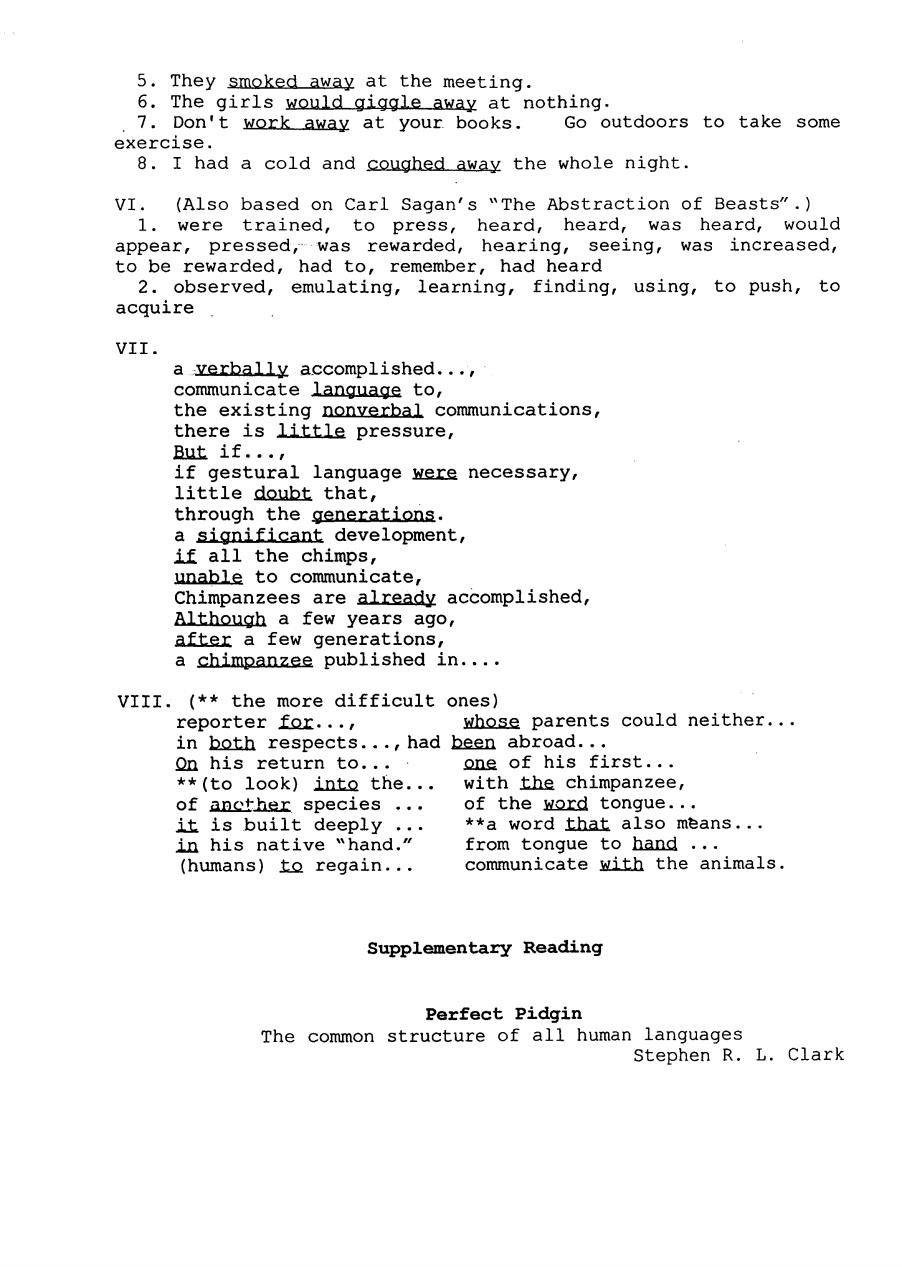
5.They smoked away at the meeting. 6.The girls would giggle away at nothing. 7.Don't work away at your books.Go outdoors to take some exercise. 8.I had a cold and coughed away the whole night. VI.(Also based on Carl Sagan's "The Abstraction of Beasts".) 1.were trained,to press,heard,heard,was heard,would appear,pressed,was rewarded,hearing,seeing,was increased, to be rewarded,had to,remember,had heard 2.observed,emulating,learning,finding,using,to push,to acquire. VII. a verbally accomplished..., communicate language to, the existing nonverbal communications, there is little pressure, But if..·, if gestural language were necessary, little doubt that, through the generations. a significant development, if all the chimps, unable to communicate, Chimpanzees are already accomplished, Although a few years ago, after a few generations, a chimpanzee published in.... VIII.(*the more difficult ones) reporter for.··, whose parents could neither... in both respects...,had been abroad... On his return to... one of his first... **(to look)into the...with the chimpanzee, of ancther species·.· of the word tongue... it is built deeply .. **a word that also means... in his native "hand." from tongue to hand .. (humans)to regain.·. communicate with the animals. Supplementary Reading Perfect Pidgin The common structure of all human languages Stephen R.L.Clark